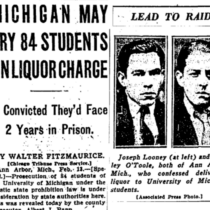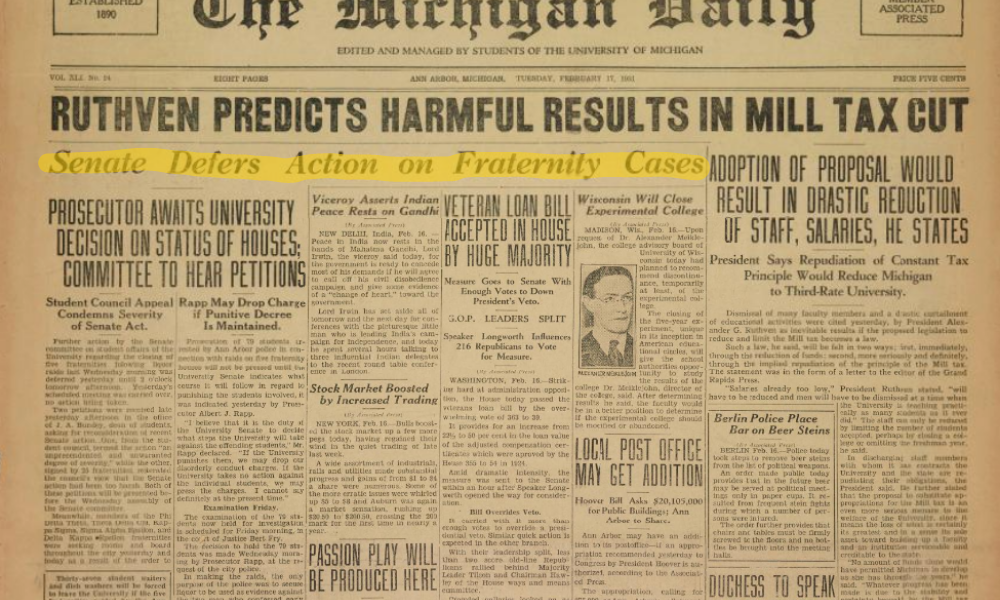Magazine

Last Call
Prohibition drove alcohol underground at U-M beginning in 1920. But apparently not underground enough. A police raid in 1931 brought national attention to drinking on campus. Archived records at the Bentley show how U-M administrators responded—and what the fallout was like.
By Andrew Rutledge
At 12 A.M. on January 17, 1920, the Eighteenth Amendment to the Constitution went into effect. From that moment on, “Prohibition” made it illegal for any American to “manufacture, sell, barter, transport, import, export, deliver, furnish, or possess any intoxicating liquor.”
Traditionally, the University of Michigan had taken a neutral stance in the national debate over alcohol. But Prohibition changed the University’s stance, both legally and as part of its broader in loco parentis philosophy, where school officials closely supervised students’ behavior outside the classroom.
Nevertheless, alcohol was still widely, if quietly, available. Due to its proximity to Canada, Detroit was a major center for alcohol smuggling, and it was easy for Michiganders to purchase drinks from there.
The records of the University Discipline Committee, responsible for determining punishment for students breaking University rules, are full of incidents involving alcohol. In 1929, for example, a trio of students was arrested for running a bootlegging operation from their dormitory. All three were suspended.
But the most egregious alcohol-related incident on U-M’s campus kicked off on the night of Tuesday, February 10, 1931.
That evening, the Ann Arbor police arrested a pair of bootleggers. Under questioning, they confessed that they had delivered alcohol to five fraternity houses earlier that night. The fraternities’ members had purchased the booze in preparation for the annual J-Hop junior dance that weekend. Search warrants were swiftly issued, authorizing the police to search the fraternities.
The police struck in the early hours of the morning, ransacking the houses from top to bottom and arresting every one of the 79 students they found. The results:
- Sigma Alpha Epsilon—four quarts and one pint of whiskey
- Phi Delta Theta—four quarts and nine pints of whiskey
- Delta Kappa Epsilon—four quarts of whiskey and half a case of beer
- Kappa Sigma—fourteen quarts of whiskey, four quarts of gin, and three quarts of wine
- Theta Delta Chi—nine quarts and four pints of whiskey, and one quart of gin.
The police had also brought a reporter along on the raids. The next morning, accounts of the raids appeared in newspapers from coast to coast. “Fraternity Houses Raided at Michigan” read The New York Times. In Los Angeles, Californians woke to the headline: “Raids Net Seventy Students.” Papers in Chicago, Boston, Washington, D.C., and Naples, Florida, as well as a host of smaller towns across the Midwest, also carried the story. It even made the news in Honolulu.
Even more embarrassingly, the police had provided a list of those arrested and several papers printed the names. The list included some of the most popular and influential students on campus, such as James Simrall, captain of the football team; Morton Bell, president of the student council; Carl Forsythe, night editor of The Michigan Daily; and Louis Colombo Jr., “son of a prominent Detroit lawyer.”
When his breakfast was interrupted by the news the next morning, Dean of Students Joseph Bursley was furious. Both at the students for breaking the law and at the bad press for the University. And while the students had been released from jail, they’d all been ordered to appear in court that Friday.

The Michigan Daily covered the fallout from the alcohol raid on U-M fraternities in February 1931.
Bursley knew a trial would only cause a deeper scandal for the University, so he and other U-M officials hurriedly met with the city prosecutor. They convinced him not to press charges, promising that the University would punish the malefactors. That afternoon, Bursley met with the Discipline Committee to decide how to do exactly that.
Due to the fraternity members’ “conduct detrimental to the best interests of the University and the serious injury to the University’s reputation,” the Discipline Committee determined that the fraternities would be suspended until September 1931 and placed on social probation for more than a year. Furthermore, the residents of the five fraternities were ordered to leave their houses by February 20. They were banned from returning to the fraternities until the fall term. However, the students themselves would not be suspended or placed on probation.
Instantly, 182 students were made homeless in the middle of winter, scrambling around town for new lodgings. But it was not just fraternity brothers who were affected. Thirty-seven more students who worked as waiters and dish washers in the five houses also lost their lodgings, as well as their jobs in the midst of the Great Depression. At least two of them were African Americans: James Slade and Raymond Hayes, who lived and worked at the Kappa Sigma house. Neither returned to Michigan in the fall.
Letters poured into Bursley’s office from alumni and parents. He carefully archived them, and they reveal polarized opinions on both the crime and the punishment. Many denounced the closing of the houses, arguing “the boys . . . [were] only doing what nine out of ten of the rest of us do.” Others praised the decision for assuring parents that “there is one place they can send their children with some peace of mind . . . regarding the moral atmosphere.”
Bursley responded to many of these letters, primarily those from prominent alumni, countering some of the sensationalism from the newspapers and seeking to explain the University’s punishment. The state legislature threatened to investigate alcohol on the campus, but the investigation never materialized, and the story soon faded from the news. The five fraternity houses eventually reopened in September 1932, and fraternity alumni pledged to ensure an end to liquor violations.
Just over a year later, in December 1933, the 21st Amendment repealed Prohibition, and U-M’s bootlegging-related problems were officially a thing of the past. Doubtless, many a glass was raised in Ann Arbor in celebration.
